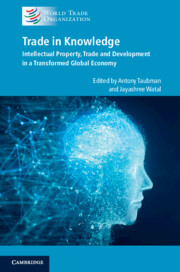Book contents
- Frontmatter
- Contents
- Figures
- Tables
- Contributors
- Preface
- 1 Thematic Overview: Charting the Evolution of Knowledge Flows
- Part I Conceptual Framework
- Part II Measuring Trade in Knowledge
- Part III Impact of Knowledge Flows on Trade and Development
- Part IV Policy, Regulatory and Legislative Frameworks
- Part V Looking Forward
- Index
25 - Looking Forward: Building the Foundations for Policymaking in the Knowledge Economy
from Part V - Looking Forward
Published online by Cambridge University Press: 17 February 2022
- Frontmatter
- Contents
- Figures
- Tables
- Contributors
- Preface
- 1 Thematic Overview: Charting the Evolution of Knowledge Flows
- Part I Conceptual Framework
- Part II Measuring Trade in Knowledge
- Part III Impact of Knowledge Flows on Trade and Development
- Part IV Policy, Regulatory and Legislative Frameworks
- Part V Looking Forward
- Index
Summary
This chapter recapitulates and puts into their broader context the contributing authors’ diverse insights into trade in knowledge today, the gaps identified in conceptual understanding and empirical data, and the prospects for addressing these gaps. A stronger empirical and theoretical platform can support further policy dialogue and research, but requires improving the reach, quality and granularity of statistics, and analysing available data in more sophisticated ways, including through greater integration of different forms of data (such as measures of the value and trends of trade as a proxy for knowledge transactions, and more nuanced interpretation of IP statistics). Policy and legal analysis need to ‘unbundle’ the knowledge component from various proxies for it (such as trade in IP-rich goods, trade in knowledge-intensive services, and trade in IP rights for such goods as software and creative content), and distinguish the component of global value chains comprised of IP transactions. This would provide a surer foundation for policymakers to identify and implement positive opportunities to leverage indigenous knowledge resources and incoming knowledge flows for sustainable development and welfare-enhancing trade and economic policy, and address anomalies such as taxation distortion and flawed assumptions about the true economic value of knowledge-based trade in goods and services. These developments pose challenges for policy coherence and international governance, given the diversification of approaches at domestic level and in the emerging patchwork of bilateral and regional agreements, contrasting with the policy coherence and interoperability between jurisdictions that the WTO TRIPS Agreement has brought about over the past 25 years. Multilateral institutions – founded on the principle that international cooperation is positive-sum in character – may seek to update and consolidate the governance framework for knowledge flows, or at least work towards informed policy coherence and dialogue, supported by a forward-looking research agenda and guided by the inherently non-rivalrous character of technological knowledge.
- Type
- Chapter
- Information
- Trade in KnowledgeIntellectual Property, Trade and Development in a Transformed Global Economy, pp. 771 - 806Publisher: Cambridge University PressPrint publication year: 2022

